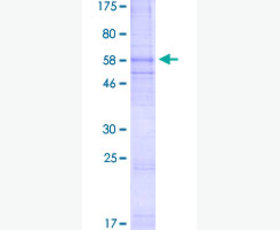Recombinant Human LMW-PTP/ACP1
| Product name: | Recombinant Human LMW-PTP/ACP1 |
| Source: | E.coli |
| Purity: | Greater than 95% as determined by reducing SDS-PAGE. |
| Buffer Formulation: | Supplied as a 0.2 μm filtered solution of 20mM TrisHCl, 150mM NaCl, 10% Glycerol, pH 8.0. |
| Applications: | Applications:SDS-PAGE; WB; ELISA; IP. |
| Storage: | Avoid repeated freeze/thaw cycles. Store at 2-8 oC for one month. Aliquot and store at -80 oC for 12 months. |
| UOM: | 100ug/50ug/200ug/1mg/1g |
| Source | E.coli |
| Description | Recombinant Human LMW-PTP is produced by our E.coli expression system and the target gene encoding Ala2-His158 is expressed with a 6His tag at the C-terminus. |
| Names | Low Molecular Weight Phosphotyrosine Protein Phosphatase, LMW-PTP, LMW-PTPase, Adipocyte Acid Phosphatase, Low Molecular Weight Cytosolic Acid Phosphatase, Red Cell Acid Phosphatase 1, ACP1 |
| Accession # | P24666 |
| Formulation | Supplied as a 0.2 μm filtered solution of 20mM TrisHCl, 150mM NaCl, 10% Glycerol, pH 8.0. |
| Shipping |
The product is shipped on dry ice/ice packs. |
| Storage |
Store at < -20°C, stable for 6 months after receipt. Please minimize freeze-thaw cycles. |
| Purity |
Greater than 95% as determined by reducing SDS-PAGE. |
| Endotoxin | Less than 0.1 ng/µg (1 IEU/µg) as determined by LAL test. |
| Amino Acid Sequence |
AEQATKSVLFVCLGNICRSPIAEAVFRKLVTDQNISENWVIDSGAVSDWNVGRSPDPRAVSCLRN HGIHTAHKARQITKEDFATFDYILCMDESNLRDLNRKSNQVKTCKAKIELLGSYDPQKQLIIEDP YYGNDSDFETVYQQCVRCCRAFLEKAHLEHHHHHH
|
| Background | Low Molecular Weight Phosphotyrosine Protein Phosphatase (LMW-PTP) is a member of the low molecular weight phosphotyrosine protein phosphatase family. LMW-PTP serves as an acid phosphatase and a protein tyrosine phosphatase (PTPase) by hydrolyzing protein tyrosine phosphate to protein tyrosine and orthophosphate. LMW-PTP can be detected in all human tissues, including adipocytes. LMW-PTP is a cytosolic enzyme that regulate cell proliferation and growth of leiomyomas during dephosphorylation of the PDGF receptor. In addition, LMW-PTP plays an important role in the regulation of physiological functions, such as stress resistance and synthesis of the polysaccharide capsule. |














